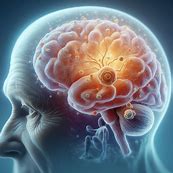Introduction to Alzheimer’s Disease
Alzheimer’s disease is a progressive neurodegenerative disorder that deteriorates memory, thinking, and behavior. It is the most common form of dementia, accounting for 60-80% of all dementia cases globally. Alzheimer’s gradually impairs cognitive functions, disrupts personality, and affects millions of people worldwide. While it mainly impacts individuals over 65, early-onset Alzheimer’s can develop much earlier, even in the 40s or 50s. As life expectancy increases globally, Alzheimer’s is becoming a significant public health issue.
For those seeking a holistic approach, homeopathic treatment for Alzheimer’s disease offers alternative care that focuses on managing symptoms by balancing the individual’s emotional and physical state. Homeopathy addresses both the cognitive decline and behavioral changes associated with Alzheimer’s, aiming to enhance the quality of life for patients and their families.
Definition of Alzheimer’s Disease
Alzheimer’s disease is a complex neurodegenerative disorder marked by progressive cognitive decline, memory loss, and behavioral symptoms. It stems from abnormal accumulations of proteins like beta-amyloid plaques and tau tangles in the brain, disrupting neuron communication and leading to cell death. These brain changes erode an individual’s cognitive functions, eventually hindering basic life tasks and personal relationships. Though its precise cause remains unclear, genetics, lifestyle, and environmental factors are thought to contribute. The average life expectancy post-diagnosis is 4 to 8 years, though some may live longer depending on care and various factors.
Understanding Alzheimer’s: More Than Memory Loss
While memory loss is a well-known symptom, Alzheimer’s impacts many cognitive functions. From mild forgetfulness to severe impairment in reasoning, judgment, and language, the emotional and behavioral changes can be equally distressing. Individuals with Alzheimer’s struggle with everyday tasks like finances, cooking, and communication, eventually requiring full-time care.
Phases of Alzheimer’s Disease
Alzheimer’s develops in stages:
- Preclinical Phase: Brain changes occur before symptoms emerge.
- Mild Cognitive Impairment (MCI): Mild memory problems arise but don’t yet disrupt daily life.
- Mild Alzheimer’s Disease: Everyday activities become difficult, with noticeable behavior changes.
- Moderate Alzheimer’s Disease: Memory loss worsens, and individuals need help with basic tasks.
- Severe Alzheimer’s Disease: Cognitive decline reaches its peak, with complete dependency on caregivers.
Symptoms of Alzheimer’s Disease
The primary symptoms of Alzheimer’s include:
- Cognitive Symptoms: Memory loss, confusion, impaired judgment, and speech difficulties.
- Behavioral Symptoms: Depression, aggression, paranoia, and hallucinations.
- Physical Symptoms: Trouble walking, swallowing, and controlling bodily functions.
Homeopathic Treatment for Alzheimer’s Disease
Homeopathic treatment offers a holistic path toward managing Alzheimer’s by treating the individual as a whole. Remedies are selected based on a person’s unique symptom picture, with the aim of restoring balance in their vital force. Key remedies include:
- Baryta Carbonica: For individuals with significant mental weakness and confusion.
- Anacardium Orientale: Addressing memory loss, irritability, and a split personality feeling.
- Cannabis Indica: Helpful for profound forgetfulness and inability to recall names or events.
Homeopathy’s core philosophy revolves around strengthening the body’s life energy (vital force), addressing not just the physical symptoms but also the emotional and psychological aspects of Alzheimer’s. Remedies seek to realign imbalances that contribute to cognitive decline.
Alzheimer’s and Brain Changes
In Alzheimer’s, the brain undergoes structural changes, primarily in memory, reasoning, and language areas. Beta-amyloid plaques and tau tangles disrupt neural connections, leading to memory loss and confusion. As neurons die, brain regions shrink, further affecting cognitive function.
Philosophical Considerations: Alzheimer’s and Identity
Alzheimer’s disease challenges our understanding of identity and self. As memory fragments, individuals become detached from their past and, at times, their sense of self. Alzheimer’s brings up deep philosophical questions:
- Who are we without our memories?
- What happens when we lose awareness of time?
- Is there dignity in losing self-awareness?
Homeopathic philosophy views Alzheimer’s as a disturbance in the vital force, which causes both cognitive and emotional symptoms. Restoring this force may help restore balance in patients.
Conclusion
Homeopathic treatment for Alzheimer’s disease emphasizes individualized care that goes beyond conventional symptom management. By addressing the deeper imbalances that cause cognitive decline, homeopathy offers a holistic approach to Alzheimer’s care. Through remedies tailored to each person’s unique symptom picture, it aims to restore balance, manage emotional symptoms, and improve overall well-being.
In this article, I’ve explored the complexities of Alzheimer’s disease and the potential of homeopathic treatment for Alzheimer’s disease as a holistic, compassionate approach. Alzheimer’s deeply affects both individuals and their families, altering memory, cognition, and behavior. While conventional treatments primarily focus on managing symptoms, homeopathy offers a more individualized approach, addressing the emotional, cognitive, and physical aspects of the person.
My intention is to provide insight into how homeopathy can help manage Alzheimer’s symptoms, from memory loss to behavioral changes, by focusing on restoring balance to the vital force that governs our well-being. Homeopathy sees the person as a whole, and remedies are chosen based on each patient’s unique symptoms.
While there may not yet be a cure for Alzheimer’s, homeopathy offers hope for improving the quality of life, maintaining dignity, and addressing both the mind and body in this challenging condition. I hope this information gives you a fresh perspective on the possibilities of homeopathic care.

An illustration showing the impact of Alzheimer’s disease on brain structure, memory, and cognitive function.

